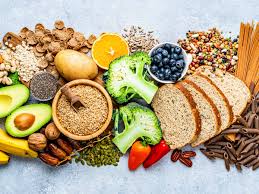When it comes to weight loss, many people instinctively think reducing their food intake drastically is the way to go. While portion control is important for healthy weight loss, research shows that restrictive diets often lead to weight gain in the long run rather than sustained loss.
Instead of cutting back, focusing on what to add to your diet can be more effective. One particularly beneficial nutrient for weight loss is fiber—a nutrient that most people in the U.S. don't consume enough of.
How Fiber Supports Weight Loss
Rita Faycurry, RD, a registered dietitian, explains that fiber-rich foods aid in weight and belly fat loss because they are generally low in calories but high in volume. This means you can eat larger portions with fewer calories, which promotes satiety and reduces overall calorie intake. "Seeing a full plate can also contribute to feeling satisfied," she adds.
Fiber-rich foods are more filling than ultra-processed foods because they digest more slowly. "Soluble fiber forms a gel-like substance in the stomach that slows digestion, helping you stay full longer," Faycurry notes.
Debbie Bessen, MS, RD, CSO, points out that soluble fiber acts like a sponge, absorbing water and slowing digestion. Fiber also helps regulate blood sugar levels, crucial for weight loss, and supports gut health by benefiting microbiome microbes. "Properly fed microbes help maintain good metabolism," she explains.
How to Add More Fiber to Your Diet
Incorporating more fiber into your diet can be simple. Jackie Newgent, RDN, suggests easy swaps like whole wheat bread for white bread or chickpea pasta for regular pasta. “Include a fiber source in every snack, such as yogurt with berries or cheese with apple slices,” she advises.
Plant-based foods are naturally high in fiber, so adding more of these to your diet is beneficial. Faycurry recommends mixing frozen vegetables into sauces, topping yogurt with berries, or adding veggies to breakfast dishes.
What to Expect When Increasing Fiber Intake
Increasing fiber can lead to improvements beyond weight loss. "People often see better blood sugar control and more energy," Faycurry says. Fiber helps prevent blood sugar spikes and improves insulin sensitivity, which is important for managing type 2 diabetes.
To avoid digestive discomfort, increase fiber gradually—about four to five grams per week—and drink plenty of water to help keep your digestive system moving. "Aim for one cup of water for every three grams of fiber," Newgent suggests.
Overall, fiber supports gut health by nourishing beneficial bacteria and preventing conditions like ‘leaky gut.’ As Bessen notes, increasing fiber can significantly impact various health goals, including weight loss and blood sugar regulation, without leaving you hungry.













0 Comments